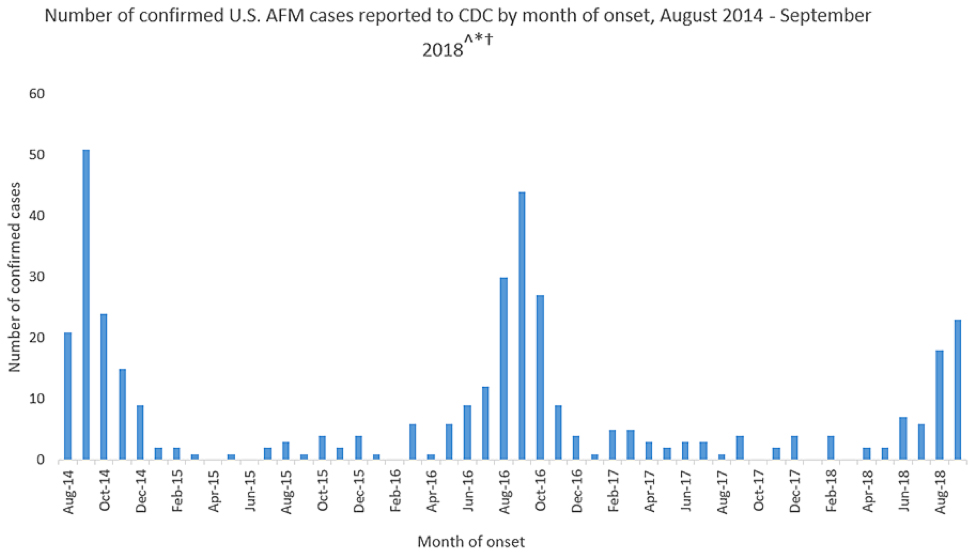Your Weekly Checkup: The Unnerving Resurgence of a Polio-like Illness
“Your Weekly Checkup” is our online column by Dr. Douglas Zipes, an internationally acclaimed cardiologist, professor, author, inventor, and authority on pacing and electrophysiology. Dr. Zipes is also a contributor to The Saturday Evening Post print magazine. Subscribe to receive thoughtful articles, new fiction, health and wellness advice, and gems from our archive.
Order Dr. Zipes’ new book, Damn the Naysayers: A Doctor’s Memoir.
Acute flaccid myelitis (AFM) is causing a big stir in the U.S. because it causes acute paralysis in children similar to polio. Here’s what we know and don’t know about this frightening disease.
According to the Centers for Disease Control, AFM is a paralytic syndrome that impacts the nervous system, mainly the spinal cord. The affected individuals, most often children, can present with polio-like symptoms, including weakness and pain in the arms and legs, difficulty moving the eyes, drooping eyelids or facial droop and weakness. Slurred speech and problems with swallowing or breathing can also occur.
The onset can be particularly frightening for parents, who should seek medical care right away if their child develops sudden weakness or loss of muscle tone in the arms or legs. While AFM is scary, it should be emphasized that it is a rare disorder, affecting one child in a million annually.

AFM can be difficult to diagnose because it shares many of the same symptoms as other neurologic diseases, like transverse myelitis and Guillain-Barré syndrome.
Symptoms have been most similar to complications of infection with certain viruses, including poliovirus, non-polio enteroviruses, adenoviruses, and West Nile virus. It is not polio, since all of the AFM cases have tested negative for poliovirus. The cause of AFM remains unknown, and no virus or bacteria has been consistently identified. Some information suggests an association between enterovirus D68 and acute flaccid myelitis.
While AFM is very rare, those affected may require extensive physical therapy. The long-term effects are variable. Some patients diagnosed with AFM recover quickly, while others need ongoing care. Some children paralyzed by AFM have eventually regained their ability to walk over time.
Strangely, incidents of the disease appear to spike in the fall of even-numbered years, such as 2014, 2016, and 2018, the reasons for which are not fully understood. From 2014 through September 2018, the CDC has received information on a total of 386 confirmed cases of AFM across the U.S. So far in 2018, there are 62 confirmed cases of AFM, occurring in 22 states.
While the cause of most of the AFM cases is unknown, one should practice disease prevention steps, such as staying up-to-date on vaccines, washing hands and maintaining cleanliness, and protecting oneself from mosquito bites that can carry West Nile virus and other vector-borne diseases.
No specific treatment exists at present for AFM, but if AFM is suspected, one should contact a physician promptly. AFM is diagnosed by examining a patient’s nervous system, combined with magnetic resonance imaging to investigate a patient’s brain and spinal cord, lab tests on the cerebrospinal fluid around the brain and spinal cord, and nerve conduction studies (impulses sent along a nerve fiber). It is important that the tests are done as soon as possible after the patient develops symptoms. Physical or occupational therapy to help with arm or leg weakness caused by AFM may be useful.
A final note: prevention is the byword in health care. As an adult, be sure you’re vaccinated against diseases that can be prevented such as flu, pneumococcus, and shingles. Be sure your children are vaccinated against a host of diseases.
I read recently about parents holding chickenpox parties, so their children could catch the disease from infected friends. This is wrong. The actual disease can cause high fever, itchy, watery blisters, headache, and in severe cases, dizziness, disorientation, rapid heartbeat, shortness of breath, tremors, loss of muscle coordination, worsening cough, vomiting, or stiff neck.
The best choice is prevention. The vaccine confers immunity without those terrible signs and symptoms.